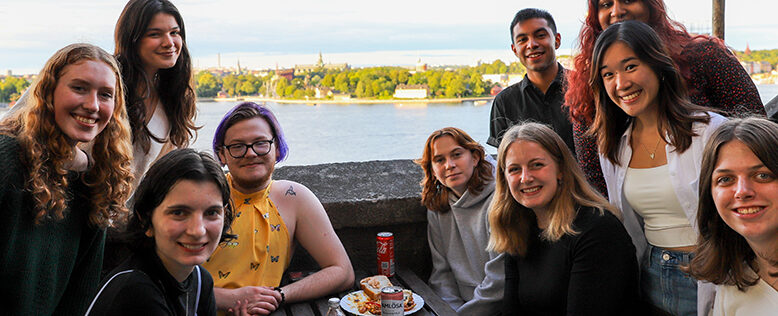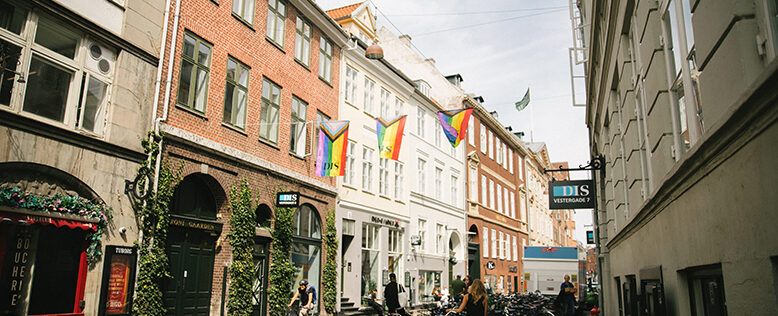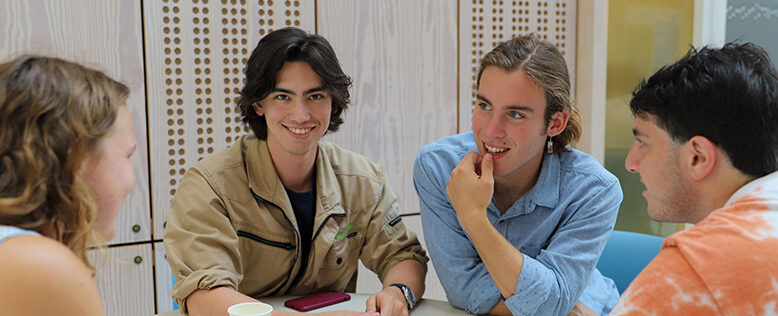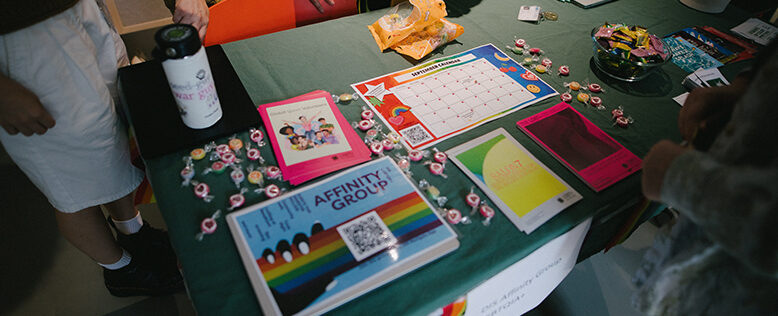We strive to create a community in which each member feels welcome and supported, irrespective of their identities and life experiences. This includes, but is not limited to, diversity of race, ethnicity, religion, gender, sexual preference, and socio-economic background.
Students’ interactions with the new and unfamiliar is an integral part of a formative study abroad experience. The learning environment we create pulls from both the U.S. higher education context and the Scandinavian experience of diversity to empower students to learn from their surroundings and from one another. Our goal is to foster a space for discussion and debate of different views while upholding our unwavering commitment to diversity and respect for others.
We work towards putting diversity, equity, and inclusion at the center of how we define an impactful learning environment – and do this by improving financial support, building inclusive learning and social spaces, providing staff and faculty DEI training, and rethinking access to DIS.
The information below summarizes the work DIS is doing to strengthen diversity, equity, and inclusion:
What is DIS doing to improve financial access and support?
- Increasing our programming for budget-conscious students by developing more summer programs, faculty-led, and custom programs
- Decreasing financial barriers by revising our scholarship model to offer up to $6,000 per semester for Need-Based, Merit-Based, and Diversity Scholarships and up to $1,500 per summer (depending on duration)
- Partnering with the Fund for Education Abroad (FEA) as an Access Partner, which allows FEA to offer awards up to $5,000 per semester (summer awards start at $1,250) to U.S. undergraduates with financial need who are traditionally underrepresented in education abroad including minorities, first-generation college students, and community college students
What is DIS doing to improve equity and inclusion?
- Learning from students through focus groups with diversity scholarship recipients about their experiences at DIS
- Raising awareness among faculty and staff through both mandatory and optional/targeted diversity, equity, and inclusion professional development opportunities.
- Facilitating Affinity Groups for students of color and LGBTQIA+ students in both Copenhagen and Stockholm, offering students a space to build community and explore their identities in a new cultural context. Local facilitators share personal experience and insights, and connect students with local communities and events
- Inviting students to share problematic experiences through a Bias Incident Reporting form in Copenhagen and Stockholm, giving students the ability to share with DIS any experiences of bias internally
The Student Body
DIS students come from approximately 200 distinguished colleges and universities across North America. Approximately eight percent of the DIS student population are international students studying in the U.S. Our students come from small colleges and large universities, from urban, rural, and suburban towns and cities, and they bring countless identities and life experiences.
DIS strives to be transparent in its breakdown of racial, gender, religious, and socioeconomic diversity in the student body. The statistics below are from students who self-disclosed their racial, gender, and religious identities in spring 2023.
Racial Diversity at DIS
- 72% White
- 12% Asian
- 4.5% Asian and White
- 2.5% Hispanic or Latinx and White
- 2.5% Black or African American
- 2% Hispanic or Latinx
- 1% Middle Eastern
- 1% Middle Eastern and White
- 1% Black or African American and White
Additional racial identities account for the remaining 4% of the student cohort.
Gender Diversity
- 70% Female
- 28% Male
- 2% Gender Non-Binary
In addition, 20% identified as members of the LGBTQIA+ community.
Religious Diversity
- 32% Christian
- 27% Agnostic
- 20% Jewish
- 14% Atheist
- 2% Hindu
- 1% Buddhist
- 1% Muslim
- 4% Other
Socio-Economic Diversity at DIS
In the spring 2023 cohort, 8% of students reported being first-generation college students and 12% reported being Pell-Grant recipients.
Across DIS Copenhagen and DIS Stockholm, 233 students were awarded Diversity and/or Need-Based Scholarships for the spring 2023 semester. This means that more than 1 in every 20 students received up to $6,000 in funds this semester, with priority being on supporting students who are underrepresented in study abroad, including but not limited to diverse ethnic, racial, cultural, economic, or educational backgrounds, sexual orientation, national origin, disability, age, and veteran status.
Courses with Diversity, Equity, and Inclusion Themes
The DIS curriculum highlights many aspects of diversity. Below are some of the courses that offer such themes:
Copenhagen
- Activism: Engagement and Resistance
- African American Expats in Copenhagen and Paris
- Children in a Multicultural Context
- Children with Special Needs
- Equality in Scandinavia: Developments and Challenges of the Welfare State
- Fleeing Across Boarders: International Refugee Law
- Gender Perspectives on Human Rights
- Health and Gender Inequalities, Social Change and Active Citizenship
- History of Sexuality in Europe
- Holocaust and Genocide
- Identity Lab: Transforming Prejudice, Discrimination, and Conflict
- Inclusive Design in Architecture and Urban Spaces
- Leadership Across Cultures
- Masculinities in Scandinavia
- Migrants, Minorities, and Belonging in Denmark
- Muslims in the West
- Postcolonial Europe: Narratives, Nationalism, and Race
- Prostitution & the Sex Trade
- Psychology of Human Sexuality
- Public Mental Health
- Stolen Childhoods: Migrant and Refugee Children in Europe



